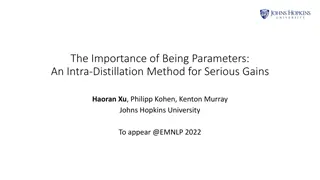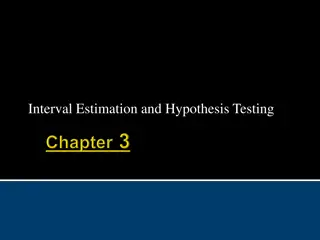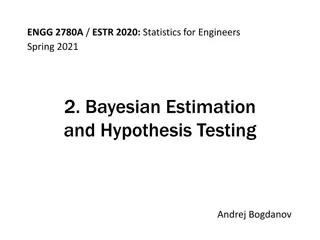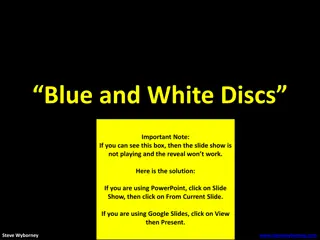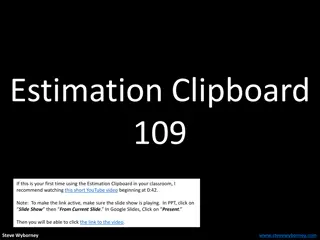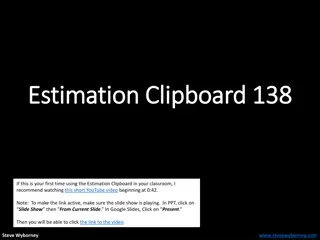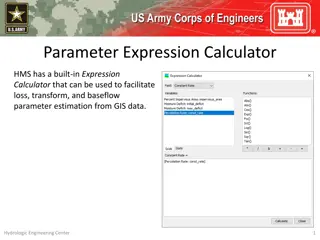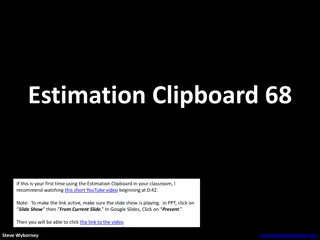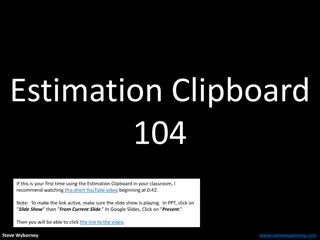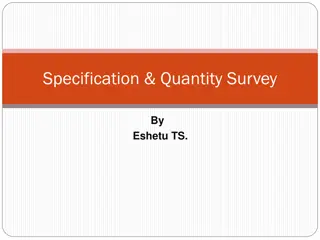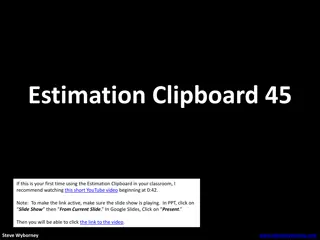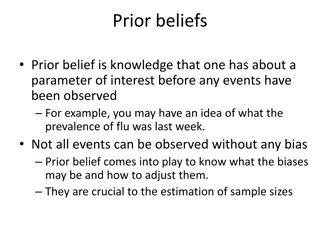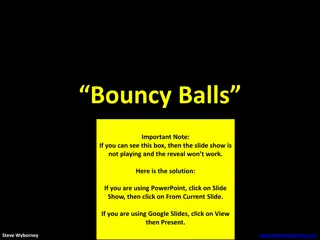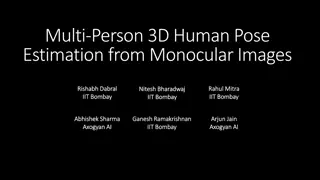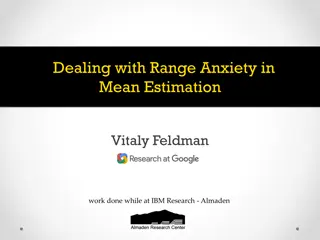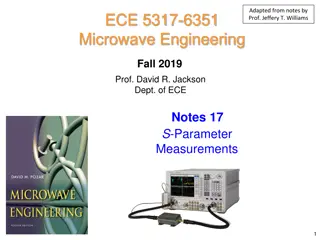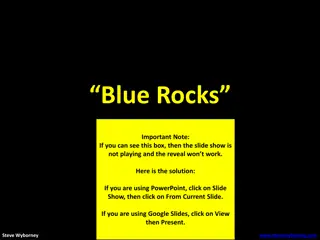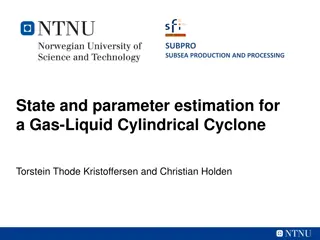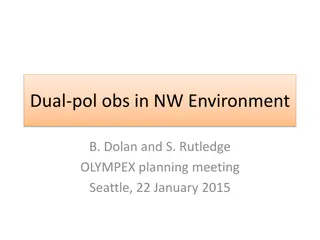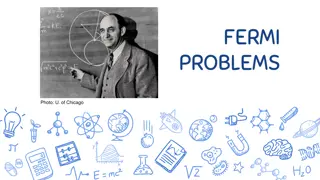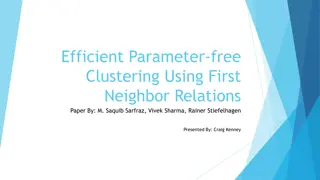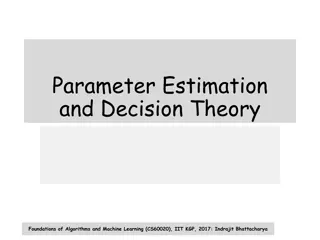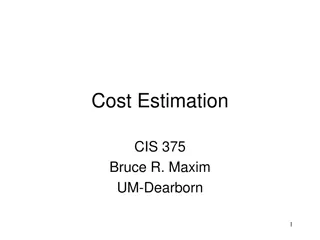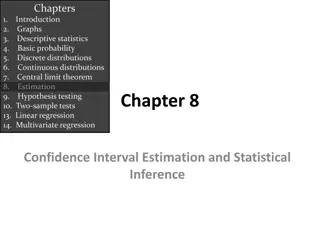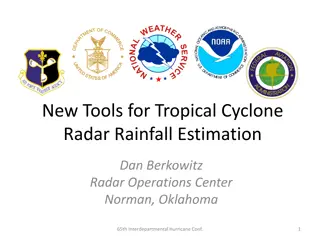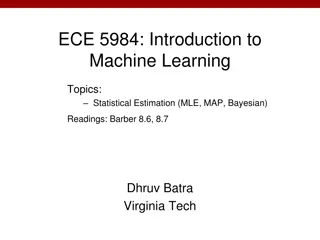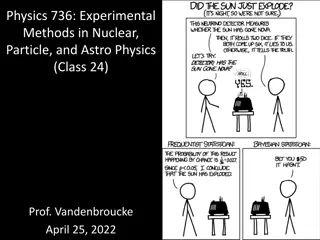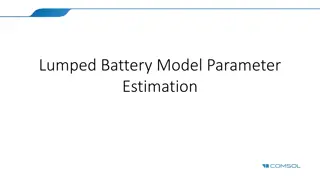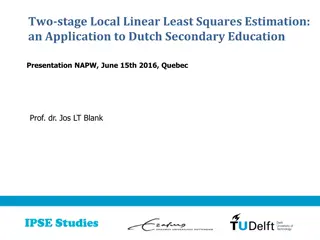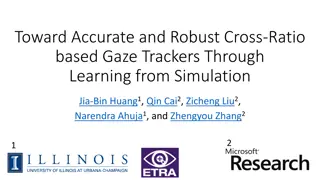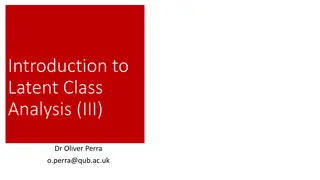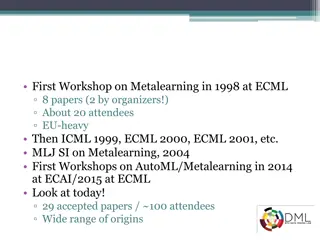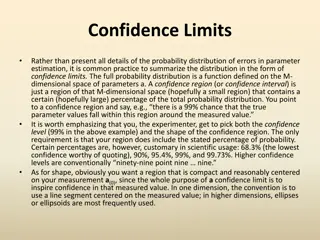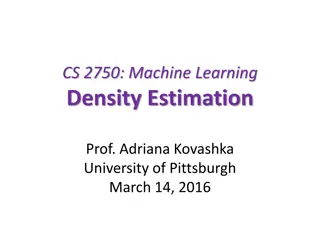Demand Estimation and Demand Forecasting
Demand estimation and forecasting are crucial processes for businesses to predict future demand for their products or services. Demand estimation involves analyzing the impact of various variables on demand levels and pricing strategies, while demand forecasting helps in planning production, new pro
1 views • 7 slides
Introduction to Econometric Theory for Games in Economic Analysis
This material delves into the fundamentals of econometric theory for games, focusing on estimation in static and dynamic games of incomplete information, as well as discrete static games of complete information, auction games, and algorithmic game theory. It covers basic tools, terminology, and main
8 views • 31 slides
Fun Estimation Game: Fishing for Four Mystery
Dive into the fun and engaging estimation game "Fishing for Four" where you use clues to narrow down the number of fish in a vase and outside it. As you decipher the hints, refine your estimates and reach the final answer of 24 fish. Enjoy the challenge and sharpen your estimation skills with this i
7 views • 6 slides
Intra-Distillation for Parameter Optimization
Explore the concept of parameter contribution in machine learning models and discuss the importance of balancing parameters for optimal performance. Introduce an intra-distillation method to train and utilize potentially redundant parameters effectively. A case study on knowledge distillation illust
8 views • 31 slides
Understanding Interval Estimation and Hypothesis Testing in Statistics
The concept of interval estimation and hypothesis testing in statistics involves techniques such as constructing interval estimators, performing hypothesis tests, determining critical values from t-distributions, and making probability statements. Assumptions must be met in linear regression models
0 views • 25 slides
Bayesian Estimation and Hypothesis Testing in Statistics for Engineers
In this course on Bayesian Estimation and Hypothesis Testing for Engineers, various concepts such as point estimation, conditional expectation, Maximum a posteriori estimator, hypothesis testing, and error analysis are covered. Topics include turning conditional PDF/PMF estimates into one number, es
1 views • 16 slides
Estimation Mystery: How Many Discs in the Container?
Explore the mystery of how many discs are in a container by analyzing clues and narrowing down possibilities. Through estimation and deduction, arrive at the final answer of 44 discs. Test your estimation skills with this interactive challenge.
0 views • 6 slides
Utilizing the Estimation Clipboard for Engaging Math Activities
Enhance student engagement in math with the Estimation Clipboard tool. Follow tips provided for effective use, promoting active participation and critical thinking. Encourage estimation skills development through interactive activities using visual representations like apple vase estimations. Watch
0 views • 5 slides
Tips for Engaging Students with the Estimation Clipboard
Enhance student engagement in math with the Estimation Clipboard by following a structured approach. Encourage estimating, writing, discussing, and reflecting to promote mathematical reasoning and active participation. Utilize the provided tips to create a dynamic learning environment and foster a d
7 views • 5 slides
Parameter Expression Calculator for Efficient Parameter Estimation from GIS Data
Parameter Expression Calculator within HEC-HMS offers a convenient tool to estimate loss, transform, and baseflow parameters using GIS data. It includes various options such as Deficit and Constant Loss, Green and Ampt Transform, Mod Clark Transform, Clark Transform, S-Graph, and Linear Reservoir. U
2 views • 5 slides
Rubber City MTC Estimathon: An Exciting Estimation Challenge!
Welcome to the first annual Rubber City MTC Estimathon where teams tackle 12 estimation problems within 30 minutes. The goal is to provide the closest approximate guess to the correct answer using minimum and maximum values. The smaller the correct ratio in each guess, the higher the score. Teams mu
0 views • 12 slides
Estimation Clipboard 68 and New Esti-Mysteries Resources
Dive into Estimation Clipboard 68 and explore new Esti-Mysteries and Number Sense resources for everyday use in the classroom. Discover engaging activities and tools designed by Steve Wyborney to enhance mathematical learning experiences. Watch the instructional video, solve the bear estimation chal
0 views • 4 slides
Guide to Using the Estimation Clipboard in Your Classroom
Explore tips for effectively utilizing the Estimation Clipboard in your classroom, including strategies for engaging all students, promoting mathematical reasoning, and fostering a collaborative learning environment. Enhance student participation and critical thinking skills through guided estimatio
0 views • 5 slides
Project Cost Estimation: Methods and Factors
Project cost estimation involves valuing all monetary aspects necessary for planning, implementing, and monitoring a project. This includes various entrants such as preliminary investigation costs, design fees, construction expenses, and more. The purpose of cost estimation is to determine work volu
1 views • 44 slides
Using the Estimation Clipboard in the Classroom
Explore tips for effectively using the Estimation Clipboard in the classroom to engage students in mathematical reasoning and estimation activities. The process involves inviting students to share estimates, encouraging written estimates and discussions, and revealing answers to promote engagement a
0 views • 5 slides
Understanding Prior Beliefs and Eliciting Expert Opinions in Parameter Estimation
Prior beliefs play a crucial role in estimating parameters of interest before observing events. They can be elicited from sources like meta-analyses, literature, and expert opinions. Experts' beliefs are often measured using Beta or Normal distributions for different outcomes. Eliciting prior belief
0 views • 22 slides
Fun Estimation Activity with Bouncy Balls!
Enjoy a thrilling estimation challenge involving bouncy balls hidden in a vase. Analyze the clues, eliminate possibilities, and make your best guess to reveal the answer. Test your estimation skills with this engaging activity by Steve Wyborney.
0 views • 6 slides
3D Human Pose Estimation Using HG-RCNN and Weak-Perspective Projection
This project focuses on multi-person 3D human pose estimation from monocular images using advanced techniques like HG-RCNN for 2D heatmaps estimation and a shallow 3D pose module for lifting keypoints to 3D space. The approach leverages weak-perspective projection assumptions for global pose approxi
0 views • 8 slides
Dealing with Range Anxiety in Mean Estimation
Dealing with range anxiety in mean estimation involves exploring methods to improve accuracy when estimating the mean value of a random variable based on sampled data. Various techniques such as quantile truncation, quantile estimation, and reducing dynamic range are discussed. The goal is to reduce
2 views • 12 slides
Understanding S-Parameter Measurements in Microwave Engineering
S-Parameter measurements in microwave engineering are typically conducted using a Vector Network Analyzer (VNA) to analyze the behavior of devices under test (DUT) at microwave frequencies. These measurements involve the use of error boxes, calibration techniques, and de-embedding processes to extra
0 views • 20 slides
Estimation Puzzle: How Many Blue Rocks in the Vase?
A fun estimation challenge where clues are provided to narrow down the possibilities of the number of blue rocks in a vase. By using critical thinking and estimation skills, participants deduce that there are 65 blue rocks in the vase. Test your estimation abilities with engaging visual clues and de
0 views • 6 slides
State & Parameter Estimation for Gas-Liquid Cylone in Subsea Production
Discussing the challenges, research status, and scope of estimation for Gas-Liquid Cylindrical Cyclones in subsea production, focusing on the use of soft sensors and different estimation techniques like Unscented Kalman Filter and Linear Moving Horizon Estimator.
0 views • 16 slides
Dual-Pol Observations in NW Environment OLYMPEX Planning Meeting
The OLYMPEX planning meeting in Seattle on January 22, 2015 discussed the contribution of polarimetric S-band radar in rain estimation systems targeted by OLYMPEX. The use of specific differential phase (Kdp) helps in minimizing assumptions about drop size distribution, convective/stratiform distinc
1 views • 15 slides
Fermi Problems and Estimation Techniques in Science
Understand Enrico Fermi's approach to problem-solving through estimation in science as demonstrated by Fermi Problems. These problems involve making educated guesses to reach approximate answers, fostering creativity, critical thinking, and estimation skills. Explore the application of Fermi Problem
0 views • 23 slides
Efficient Parameter-free Clustering Using First Neighbor Relations
Clustering is a fundamental pre-Deep Learning Machine Learning method for grouping similar data points. This paper introduces an innovative parameter-free clustering algorithm that eliminates the need for human-assigned parameters, such as the target number of clusters (K). By leveraging first neigh
0 views • 22 slides
Foundations of Parameter Estimation and Decision Theory in Machine Learning
Explore the foundations of parameter estimation and decision theory in machine learning through topics such as frequentist estimation, properties of estimators, Bayesian parameter estimation, and maximum likelihood estimator. Understand concepts like consistency, bias-variance trade-off, and the Bay
0 views • 15 slides
Software Development Cost Estimation Best Practices
Explore key principles and techniques for accurate cost estimation in software development projects. Discover the importance of the 5WHH principle, management spectrum, critical practices, resource estimation, estimation options, and decomposition techniques for improved project planning. Learn abou
0 views • 40 slides
Understanding Estimation and Statistical Inference in Data Analysis
Statistical inference involves acquiring information and drawing conclusions about populations from samples using estimation and hypothesis testing. Estimation determines population parameter values based on sample statistics, utilizing point and interval estimators. Interval estimates, known as con
0 views • 41 slides
Advances in Tropical Cyclone Radar Rainfall Estimation
Reviewing past methods and introducing new tools for radar rainfall estimation in tropical cyclones. Discusses advancements in Dual Polarization rainfall estimation and NSSL's National Mosaic & Multi-Sensor Quantitative Precipitation Estimation. Includes insights on reflectivity-to-rainfall relation
0 views • 28 slides
Introduction to Statistical Estimation in Machine Learning
Explore the fundamental concepts of statistical estimation in machine learning, including Maximum Likelihood Estimation (MLE), Maximum A Posteriori (MAP), and Bayesian estimation. Learn about key topics such as probabilities, interpreting probabilities from different perspectives, marginal distribut
0 views • 23 slides
Understanding Maximum Likelihood Estimation in Physics
Maximum likelihood estimation (MLE) is a powerful statistical method used in nuclear, particle, and astro physics to derive estimators for parameters by maximizing the likelihood function. MLE is versatile and can be used in various problems, although it can be computationally intensive. MLE estimat
0 views • 22 slides
Lumped Battery Model Parameter Estimation Overview
This information discusses the estimation of parameters for a lumped battery model, focusing on a black-box approach for lithium-ion battery performance prediction using experimental data and optimization methods. It covers background, experimental data, model fitting parameters, geometry, operating
0 views • 9 slides
Maximum Likelihood Estimation in Statistics
In the field of statistics, Maximum Likelihood Estimation (MLE) is a crucial method for estimating the parameters of a statistical model. The process involves finding the values of parameters that maximize the likelihood function based on observed data. This summary covers the concept of MLE, how to
0 views • 19 slides
Understanding Two-Stage Local Linear Least Squares Estimation
This presentation by Prof. Dr. Jos LT Blank delves into the application of two-stage local linear least squares estimation in Dutch secondary education. It discusses the pros and cons of stochastic frontier analysis (SFA) and data envelopment analysis (DEA), recent developments in local estimation t
0 views • 24 slides
Advanced Gaze Estimation Techniques: A Comprehensive Overview
Explore advanced gaze estimation techniques such as Cross-Ratio based trackers, Geometric Models of the Eye, Model-based Gaze Estimation, and more. Learn about their pros and cons, from accurate 3D gaze direction to head pose invariance. Discover the significance of Glint, Pupil, Iris, Sclera, and C
0 views • 40 slides
Understanding Latent Class Analysis: Estimation and Model Optimization
Latent Class Analysis (LCA) is a person-centered approach where individuals are assigned to different categories based on observed behaviors related to underlying categorical differences. The estimation problem in LCA involves estimating unobservable parameters using maximum likelihood approaches li
0 views • 30 slides
Exploring Metalearning and Hyper-Parameter Optimization in Machine Learning Research
The evolution of metalearning in the machine learning community is traced from the initial workshop in 1998 to recent developments in hyper-parameter optimization. Challenges in classifier selection and the validity of hyper-parameter optimization claims are discussed, urging the exploration of spec
2 views • 32 slides
Understanding Confidence Limits in Parameter Estimation
Confidence limits are commonly used to summarize the probability distribution of errors in parameter estimation. Experimenters choose both the confidence level and shape of the confidence region, with customary percentages like 68.3%, 95.4%, and 99%. Ellipses or ellipsoids are often used in higher d
0 views • 16 slides
Understanding the Black-Scholes Formula and Volatility Estimation
The Black-Scholes formula, developed by Dr. Fernando Diz, is a widely used model for pricing options. This formula calculates the theoretical price of an option based on various inputs, with volatility being a key factor. Volatility estimation can be done through historical or implied methods, each
0 views • 18 slides
Machine Learning Density Estimation and Bayesian Inference
Delve into the world of machine learning density estimation, parameter estimation, and Bayesian Bernoulli inference. Explore topics such as parametric distributions, binary variables, beta distribution, and more through slides from Professor Adriana Kovashka's lecture at the University of Pittsburgh
0 views • 25 slides



